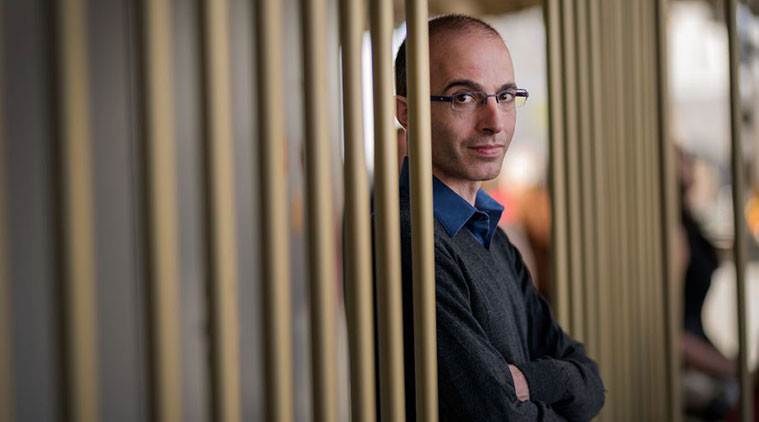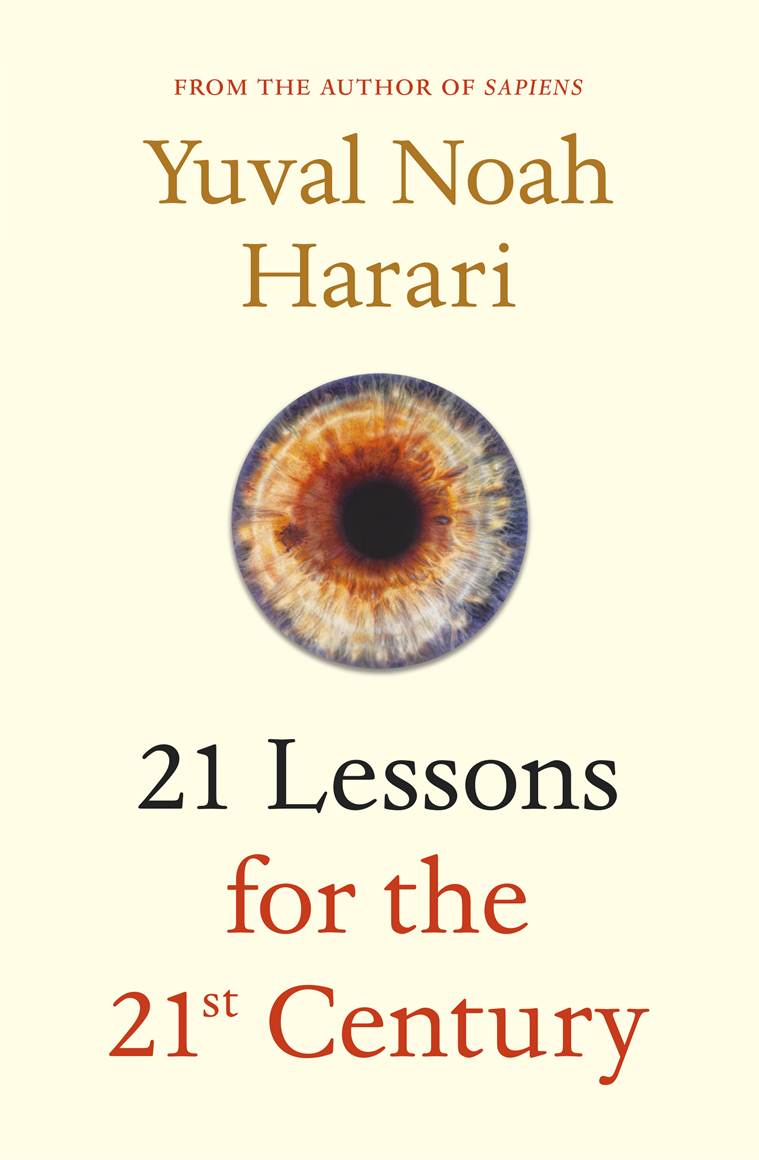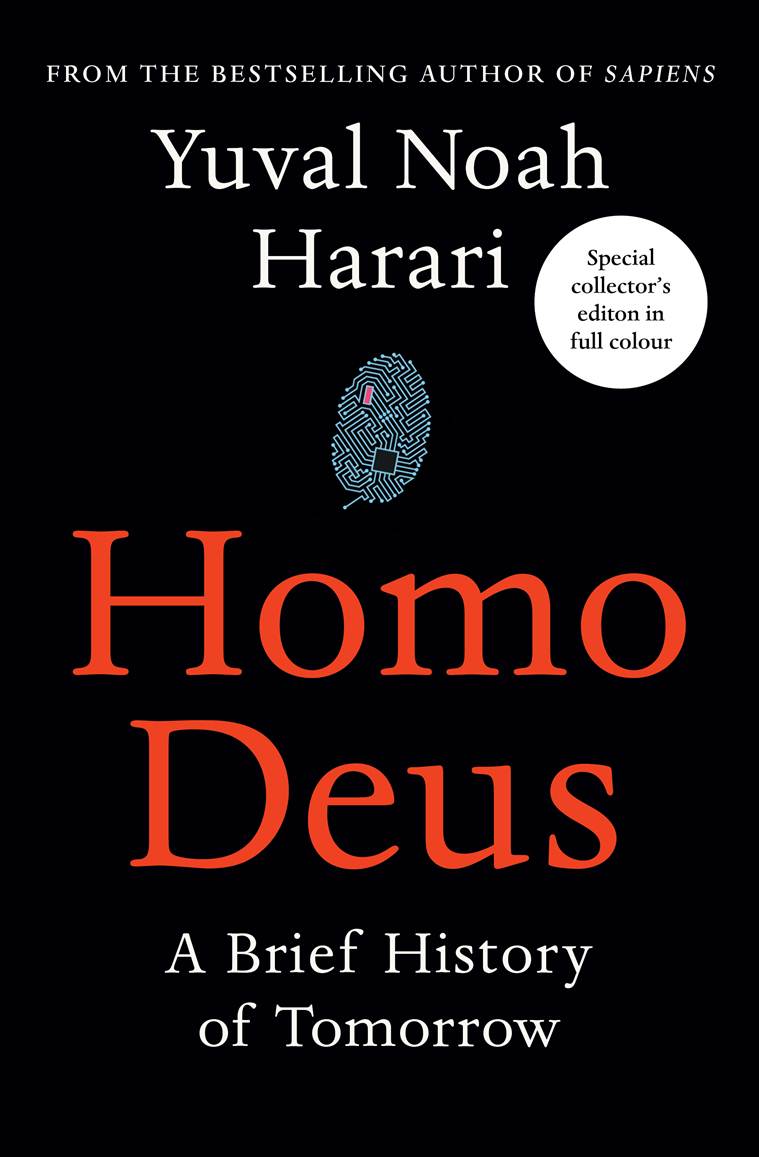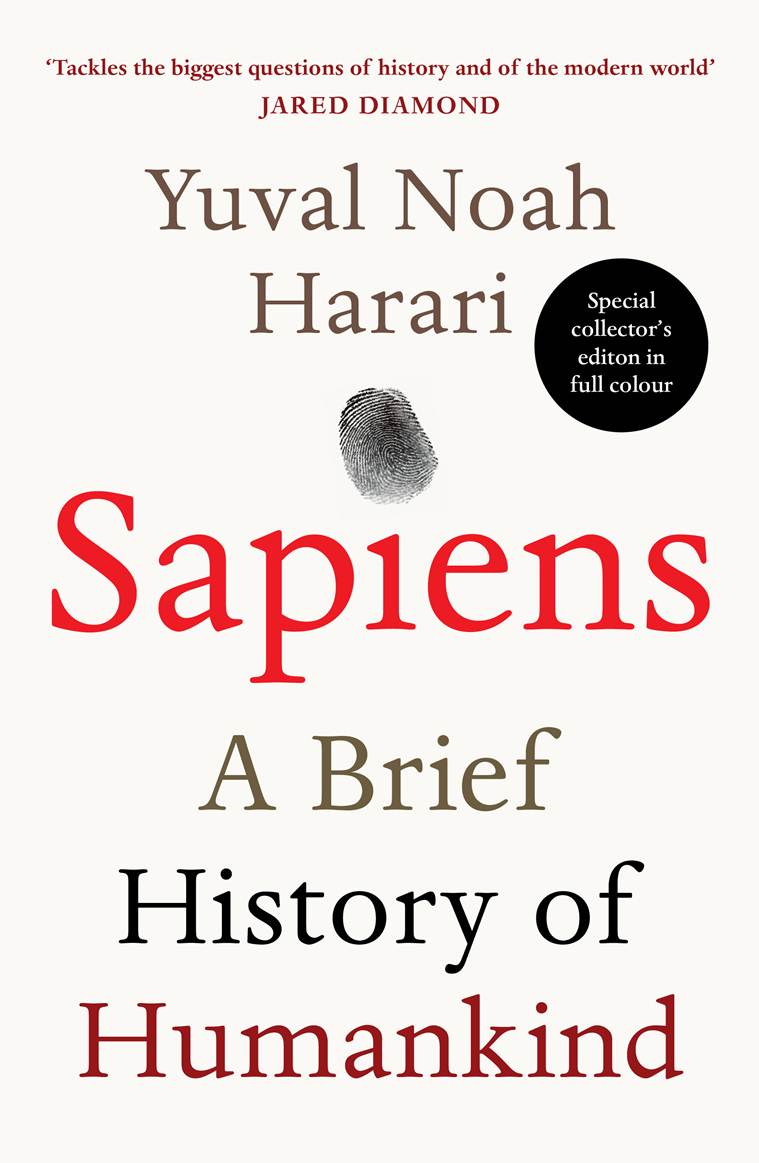- India
- International
Stranger than fiction
Author Yuval Noah Harari discusses humanity’s fictions about matters as diverse as revolution and the possibility of a dystopic world without women
 Author Yuval Noah Harari
Author Yuval Noah Harari
Author of three bestselling books on the history, present and future of the human race — Sapiens, 21 Lessons for the 21st Century and Homo Deus — Yuval Noah Harari of the Hebrew University of Jerusalem sees Homo sapiens essentially as a storytelling animal, a being that is prepared to die in defence of its preferred narrative, whether it is a religion or an ideology. He will deliver the Penguin Annual Lecture on ‘The New Challenges of the 21st Century’ in Mumbai on Sunday.
It is unusual for a historian’s work to range from Olduvai to the Silicon Valley of the future. How do you retain focus on the real story, which is history, amidst the distracting noise of politics, religion, commerce and technology, which claim agency over history?
My method is to focus on some big question, and follow wherever it leads me. This usually requires me to engage with diverse fields such as politics, religion and economics, but as long as I stay focused on the question, I don’t lose my way. Let’s take a particular example. One of the biggest questions in history is why men have dominated women in most human societies. Many people think that the answer is obvious: men are physically stronger. But that answer does not make sense, because in human society power depends on social skills rather than physical strength. Understanding what other people think, and how to compromise with them or manipulate them, is the real key for social dominance.
How do you become Prime Minister of India? Not by beating up all the other candidates. Rather, you do so by building a broad coalition of supporters. Even in organised crime, the big boss is not necessarily the strongest man. He is often an older man who very rarely uses his own fists; he gets younger and fitter men to do the dirty jobs for him. So muscle-power cannot explain male domination.
Another common theory says that men have dominated women because women need a lot of help when they are pregnant or when they take care of young children, whereas men can devote themselves to aggressively competing for leadership roles. But among other animals, such as elephants, the dynamics between dependent females and competitive males result in a matriarchal society. Since female elephants need a lot of help in raising the young, they are obliged to develop their social skills and learn how to cooperate and appease. They construct all-female social networks that help each member raise her young. Males, meanwhile, spend their time fighting and competing. Their social skills and social bonds remain underdeveloped. Elephant societies are consequently controlled by strong networks of cooperative females, while the self-centred and uncooperative males are pushed to the sidelines.

If this is possible among elephants, why not among Homo sapiens? Women, just like female elephants, need to develop their social skills in order to get help in raising children, and they constantly need to see reality from the viewpoint of another person, their child. Consequently, it is often thought that women have better social skills than men, and in particular, that women are better at understanding the needs, desires and viewpoints of other people. If so, we should expect women to use their superior social skills to cooperate among themselves and to outmanoeuvre and manipulate the aggressive and self-centered men. This did not happen. Why is it that in a species whose success depends above all on social cooperation, individuals who are supposedly less cooperative (men) control individuals who are supposedly more cooperative (women)?
To answer this question, we need to gather insights from biology, psychology, economics and many other disciplines, but all these insights should ultimate connect together to form a historical narrative.

Communications technology is regarded as an unprecedented force of revolutionary change. Arab Spring was propelled by Twitter and Facebook. But there was another Arab Spring over a millennium ago, initiated by the Prophet without benefit of social media. It is still a political force all over the Old World. In what way are contemporary revolutions different from the reform movements of the past?
The big difference is that contemporary revolutions are likely to change the very nature of humanity, rather than only the surrounding world. For thousands of years, revolutions resulted in new social, political and economic structure. But human nature didn’t change. We still have the same bodies, brains and minds that we had in the days of Muhammad, or indeed in the Stone Age. We experience love, anger and joy in the same way as our ancestors. Many revolutionaries dreamt about creating a new human, but they always failed, because they lacked the necessary technology. You cannot change human nature by preaching sermons, by writing holy books, or even by waging destructive wars.
Yet the new technologies of the 21st century, especially artificial intelligence and bioengineering, might make it possible for the first time in history to change human nature itself. To change our bodies and brains, and to change the core experiences of love, anger and joy. Within a few decades, we might even gain the power to create completely new kinds of life forms, which today we can hardly imagine.
Similarly, religious terrorism is seen to be a 20th century phenomenon, but it dates back at least 2,000 years to the Zealots in Judaea, particularly the Sicarii. So what’s new, when the bombing of the King David Hotel displayed much the same methods in use in modern times? Why are the outcomes amplified, as in 9/11?
Terrorism today has far greater political effect because people live in a far safer world. This may sound paradoxical, but it isn’t. For terrorism is a psychological weapon used by very weak parties. Terrorists lack the power to conquer countries and cities, so they stage a terrifying spectacle of violence that captures our imagination and turns it against us. By killing hundreds of people, terrorists cause hundreds of millions to fear for their lives, which often leads to overreaction, such as the US invasion of Afghanistan and Iraq.
Until recently, terrorism had a very limited psychological impact because people were used to far worse political violence. In medieval India, for example, control of provinces, cities and towns usually depended on raising large armies and fighting bloody battles. If a small terrorist group had murdered a few dozen civilians, nobody would have noticed.
In recent years, however, centralised states gradually reduced the level of political violence within their territories, and in the last few decades many countries managed to eradicate it almost entirely. The citizens of France, Britain, the US and India can struggle for control of cities, provinces and even entire countries without any need of an armed force. Command of trillions of dollars, hundreds of millions of people, and millions of soldiers passes from one group of politicians to another group without a single shot being fired. People quickly got used to this, and now consider it their natural right. Consequently, even sporadic acts of political violence that kill a few dozen people are seen as a deadly threat to the legitimacy and even the survival of the state. A small coin in a big empty jar makes a lot of noise.
This is what makes the spectacle of terrorism so successful. The state has created a huge space empty of political violence, which now acts as a sounding board, amplifying the impact of any armed attack, however small. The less political violence there is in a state, the greater the public shock at an act of terrorism. Killing a few people in France draws far more attention than killing hundreds in Nigeria or Iraq. Paradoxically, then, the very success of modern states in preventing political violence makes them particularly vulnerable to terrorism.
The state has stressed many times that it will not tolerate political violence within its borders. The citizens, for their part, have become used to zero political violence. Hence the theatre of terror generates visceral fears of anarchy, making people feel as if the social order is about to collapse. After centuries of bloody struggles we have crawled out of the black hole of violence, but we sense that the black hole is still there, patiently waiting to swallow us again. A few gruesome atrocities and we imagine that we are falling back in.

Right-wing politics opposes migration and encourages us to re-establish a mythical golden age of ethnic and/or religious purity. But ancient genomes present a complex picture of migrations and interbreeding between sapiens, Neanderthals and Denisovans. This is a much more fascinating story, and you are the first author since the generation of J Bronowski to take the story of human origins to a general readership. The data has changed dramatically in the meantime, but why haven’t our perception of ourselves, as a miscegenated species, kept pace?
People are lazy thinkers. They prefer to think in sharply divided categories because it is easier. Therefore people divide humanity into different religions, ethnicities and cultures, assuming that these religions, ethnicities and cultures are pure and unchanging entities that have existed from time immemorial. This is, of course, nonsense. All religions, ethnicities and cultures were formed by merging together different peoples and traditions, and all of them constantly change.
Thus there is no pure and eternal “Hindu culture”. The Hinduism of today is very different from the Hinduism of 3,000 years ago. Today, Hindus vehemently oppose killing cows. Three thousand years ago the founders of Hindu civilisation were shepherds from Central Asia whose religion was based on the ritual slaughter of cows and other animals. Only under the influence of Buddhism and Jainism did Hinduism adopt the principles of non-violence and vegetarianism.
To take more recent examples, many Hindus today love tea, cricket, movies and chili peppers. Yet these are all foreign influences. The habit of drinking tea was introduced to India only in the 19th century by the British (who learned it from the Chinese). The British also invented cricket. Motion pictures were pioneered by Europeans and Americans. Chili peppers were domesticated in Mexico, and brought to India by the Spanish and Portuguese. I would challenge any Hindu who believes in the eternal purity of Hindu culture to stop drinking tea, stop playing cricket, stop watching movies and stop eating chili peppers.
In Sapiens, you criticised the rationalist reading of pre-literate history as events actuated by economic and demographic factors, ignoring motives like ideology and faith, which have driven politics and international relations from the Crusades to the present. What irrational motives could have actuated the individual to progress from nomadism through agriculture and industry to modernism, a process which has steadily reduced individual freedoms? Does David Graeber’s approach appeal to a formal historian?
Homo sapiens is a storytelling animal. We create fictional stories about gods, nations and corporations and these stories are the basis for our societies and the source of meaning for our lives. We are often willing to kill or be killed for the sake of these stories.
Few wars in history were fought over purely economic and demographic factors. Unlike wolves and chimpanzees, humans don’t fight about territory and food, they fight about stories. Consider the First World War, for example. Why did Germany and Britain fight one another? Not due to lack of territory or lack of food. In 1914, there was enough territory to build houses for all Germans and British, and there was enough food to sustain all of them. But they could not agree on a common story, in which they could all believe, so they went to war. Today, Britain and Germany are at peace not because they have more territory (they in fact have far less than in 1914), but because they do have a common story in which most British and most Germans believe.
Hinduism and Buddhism had argued thousands of years ago that humans live in the world of Maya — illusion. This is very correct. Nations, gods, corporations, money, ideologies — these are the illusions that
humans create and believe in, and that dominate history.
Homo Deus and 21 Lessons for the 21st Century ventured into transhumanism and futurism. The projections of these schools are rational, but are applied to an irrational animal. Do you think that along with artificial intelligence, downloadable personalities, the Internet of Things and flight from the home planet, there could also be a political movement yearning for a return to Eden? Any other unexpected developments that you nevertheless expect?
There might be a very strong yearning to return to the simpler life of our ancestors, but we can never actually go back. If we give up modern medicine, modern agriculture, and modern transportation, more than 90 per cent of people would starve to death or perish in devastating epidemics.
However, we might see the rise of new fanatical religions that would make use of new technologies in order to realise any number of crazy fantasies and mad utopias. For example, a lot of religious fanatics throughout history had a very negative attitude to sexuality and to women. They wanted to severely restrain human sexuality, and to hide women from sight. In the past, such fanatics could not really control human sexuality. No matter how much the leaders praised celibacy, most people didn’t want to be monks, and even many monks engaged in sex. No matter how much the zealots persecuted homosexuals, gay people continued to exist, because homosexuality is natural to Homo sapiens. No matter what efforts the fanatics made to hide women and force them to wear long clothes and stay indoors, they could not create a society without women. In the future, however, religious fanatics might try to use bioengineering and AI to completely destroy the human sexual urge, to completely eliminate homosexuality, and even to eliminate all women.
It is certain that AI and bioengineering will change the world. But they might give rise to a totalitarian religious regime rather than to a liberal democracy.

As you point out, we and our civilisation are stories, and we like to storify phenomena in order to understand them. Do these stories have a beginning, a middle and an end? Are they purposive and teleological, or are these attributes we impose to give meaning to our lives and our species?
When people look for the meaning of life, in most cases they expect to be told a story. Homo sapiens is a storytelling animal, that thinks in stories and believes that the universe itself works like a story. The story of the universe has a beginning, middle and end. It has heroes and villains, conflicts and resolutions, climaxes and happy endings. We think that in order to understand the meaning of life, I need to know the story of the universe, and discover what my role in the story is. But the universe isn’t a story. It has no script, and I have no predetermined role to play. All the stories people tell about the universe — the Jewish story, the Christian story, the Muslim story — are just fictions invented by humans.
When people hear this, they often become terrified. Without a cosmic story, they don’t understand the point of living. They are like a person who had studied for years to become an actor, and on the day she finally graduates from school, she learns that they have just shut down all the theatres and closed down the last film studio.
But there is no reason for despair. Reality is still there. You cannot play a part in any make-believe drama, but why would you want to do that in the first place? When you give up all the fictional stories, you can observe reality with far greater clarity than before, which is much better than any fiction. When you wake up in the morning, you can just focus on reality. If you really know the truth about yourself and about the world, nothing can make you miserable. But that is of course much easier said than done.
More Lifestyle
Apr 25: Latest News
- 01
- 02
- 03
- 04
- 05




































